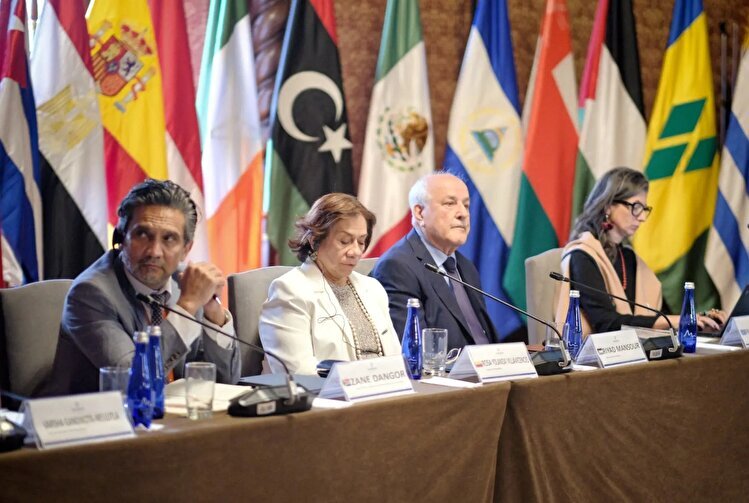Hague Is a Cornerstone in the International Community's Unity Against Israel
TEHRAN (Defapress) - Global public opinion against Israel continues to shift, with an increasing number of governments amplifying their criticism of the regime to reflect the voice of the people.

In recent weeks, several ministers of Netanyahu’s cabinet have been sanctioned by multiple Western countries. In this vein, Britain, France, and Canada issued a joint statement condemning the "unbearable level of human suffering in Gaza."
Earlier this week, a group of Global South nations, known as the "Hague Group," collectively agreed on measures they claim will curb Israel’s assault on the occupied Palestinian territories.
People, religious leaders, and politicians worldwide have widely condemned "Israel’s" crimes in Gaza following its attack on a Catholic church in Gaza.
The Nature of the Hague Group
The Hague Group consists of a coalition of countries committed to "coordinated legal and diplomatic actions" in defense of international law and solidarity with the Palestinian people.
Comprising eight nations, South Africa, Bolivia, Colombia, Cuba, Honduras, Malaysia, Namibia, and Senegal, the group has made it its mission to uphold the principles enshrined in the United Nations Charter.
Earlier this week, the Hague Group held a meeting in Colombia’s capital, attended by 30 countries, including China, Spain, and Qatar. Francesca Albanese, the UN Special Rapporteur, was also present and described the gathering as "the most significant political development in the past 20 months." Albanese was recently sanctioned by the U.S. for her criticism of Israel.
At the end of the two-day meeting, 12 attending countries agreed to pursue six measures to restrict Israel’s actions in Gaza, including: Halting arms shipments to Israel, banning vessels carrying weapons, and reviewing public contracts to identify any ties with companies profiting from Israel’s occupation of Palestine.
The Wave of Sanctions Against Israel
Last Wednesday, Slovenia barred the entry of Itamar Ben-Gvir, Israel’s National Security Minister, and Bezalel Smotrich, Finance Minister. Earlier in June, Australia, Canada, New Zealand, Britain, and Norway had already sanctioned these far-right figures for "inciting violence." Both ministers reject any compromise in negotiations with Palestinians and push for Jewish settlement expansion in Gaza and the West Bank.
In May, Britain, France, and Canada issued a joint statement describing Israel’s hostility toward Gazans as "wholly disproportionate" and warned of further action if the aggression did not stop. By the end of that month, Britain followed through, imposing sanctions on settler organizations and suspending free trade talks with Israel. Turkey also announced it would halt trade with Israel until the situation in Gaza changes.
In late December 2023, South Africa filed a genocide case against Israel at the International Court of Justice (ICJ), which has since been supported by other nations, including Colombia, Chile, Spain, Ireland, and Turkey.
Unusual U.S. Reaction
Israel’s bombing of a church in Gaza last Thursday, which killed three people, drew a rare rebuke from the U.S. Reports indicate that Donald Trump was furious and immediately criticized Netanyahu in a phone call. Netanyahu’s office swiftly issued a statement expressing "deep regret" over the attack. To date, Israel has killed over 58,000 people in Gaza, most of them women and children.
Mass Protests and Growing Anger
Large-scale public protests against Israel’s war on Gaza have erupted worldwide since the invasion began, with clear signs of mounting fury over Israel’s brutality. A YouGov poll in Western Europe showed that "Israel’s" popularity has hit its lowest level since its founding.
A similar CNN poll this week found comparable trends in the U.S., where only 23% of Americans now believe Israel’s actions in Gaza are fully justified, down from 50% in October 2023.
Public anger has also been voiced at major events, including music festivals like Germany’s Fusion Festival, Poland’s Open’er, and Britain’s Glastonbury, where artists have used their platforms to condemn the war in Gaza.
Has Anything Changed in Israel?
Anti-war protests within the occupied territories are growing, with organizations like "Standing Together" uniting Israeli and Palestinian activists against the war. A significant number of reservists have refused to serve, with reports of over 100,000 dodging duty and an increase in open letters from within the military opposing the war.
Netanyahu’s latest proposal, relocating Gaza’s entire population to so-called "humanitarian cities", has drawn sharp criticism. Despite recent backlash over the bombing of Gaza’s only Catholic church, America’s unwavering support for Israel continues, including: Diplomatic backing, use of UN Security Council vetoes, military aid through massive arms exports, and sanctions against critics of Israel, such as the International Criminal Court (ICC), whose members were sanctioned after issuing arrest warrants for Netanyahu and former Defense Minister Yoav Gallant over war crimes.
As long as Israel enjoys U.S. support, it feels secure, but in the short term, it faces heavy pressure from economic and diplomatic isolation as it becomes the most despised member of the international community.
